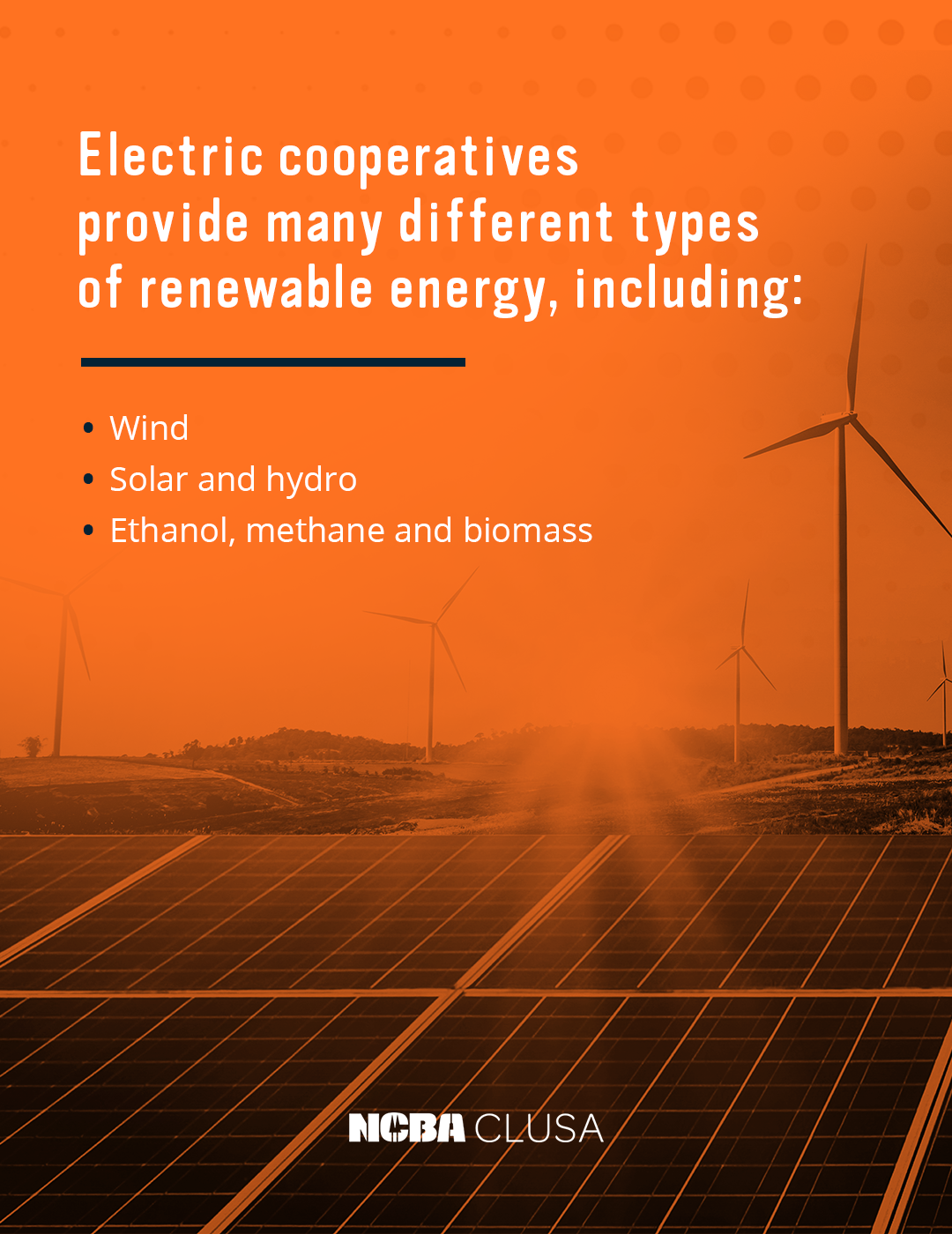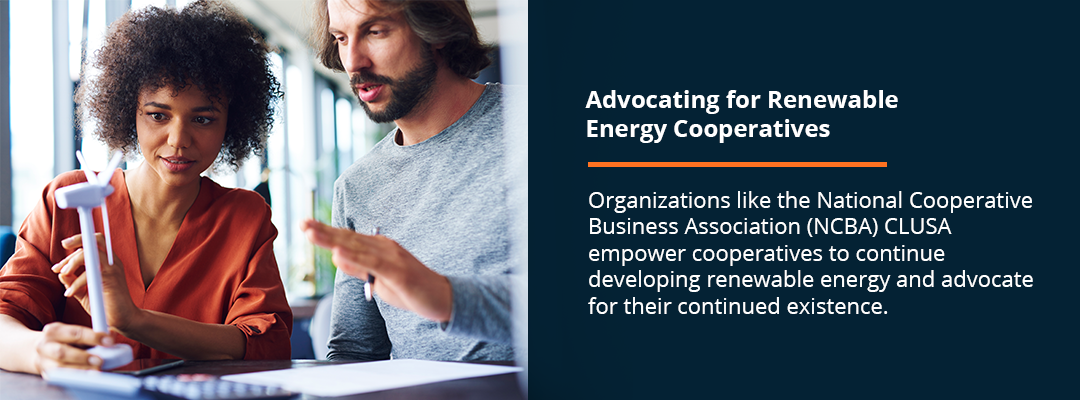Discussion and debate regarding energy resources are common in today’s news and political sphere. More and more people are becoming interested in where their energy is coming from and how companies are producing it. The movement promoting renewable resources is growing stronger as consumers and businesses demand clean alternatives. One of the most significant proponents for this push towards renewable energy is the nationwide network of electric cooperatives.
Across the U.S., energy cooperatives have been supporting clean electricity by generating and procuring renewable resources. Understanding the role rural cooperatives play in advancing clean energy is essential to recognizing how the movement is progressing as a whole.
What Is an Energy Cooperative?
To fully comprehend what an energy cooperative is and how it functions, you need to know the basics of co-operative identity and the organization of co-op groups. Cooperatives are non-profit organizations that serve their community as well as their customers and members. Their membership consists of autonomous individuals, all of which hold an equitable stake in the organization. Each cooperative centers around the core values of volunteerism, democracy and shared social and economic needs.
All cooperatives follow the same seven principles. They guide members and show them how to incorporate the co-operative identity into their practices. The seven cooperative principles are:
- Voluntary and open membership: Cooperatives are open to all volunteers and do not discriminate against any individual for their race, gender, sexuality, religion, social status or political affiliation.
- Democratic member control: All members of cooperatives have the right to vote on matters of governance, and the organization hears every voice in cases where a decision is crucial.
- Members’ economic participation: Members of the cooperative equitably contribute to their economy and benefit based on their participation.
- Autonomy and independence: The cooperative will remain autonomous and independent from the influence of outside governments and organizations, especially those with which they enter into business agreements where capital is involved.
- Education, training and information: Members of the cooperative will educate themselves and each other on the co-operative identity. They will also engage in outreach to community members and scholars to teach them about the nature and benefits of cooperative enterprise.
- Cooperation among cooperatives: Cooperatives work together to create a strong network, guided by national and international co-op organizations.
- Concern for community: All cooperatives engage in their community by way of ethical business practices and education and strive to create a better world.

These principles outline the way cooperatives should operate and what they value as an organization. Energy cooperatives function under the same guiding values. They are autonomous groups led by their membership and directly serve their members and communities.
Energy cooperatives are entirely owned and governed by their members. Everyone plays a part in deciding on matters of governance and how the co-op delivers its services. As the cooperative develops and evolves, the customers benefit directly. They all have an economic stake in the cooperative and, since it functions as a non-profit, all excess funds or profits are reinvested into the services or equally distributed as dividends.
Rural electric cooperatives specifically focus on bringing renewable energy resources to small communities and rural regions. Typically, larger distributors don’t provide services for these areas as they have a low population density and are far from any major cities. They are a part of the broader system of utility cooperatives, all of which manage public services for rural communities. Electric cooperatives make up the vast majority of the network.
Energy co-ops also make up a significant portion of the U.S. electric industry. Electric cooperatives account for over 33% of the sector, making them notable players in the movement towards renewable energy. Organizations such as the National Rural Electric Cooperative Association (NRECA), Cooperatives for a Better World and the International Co-operative Alliance strengthen the broad network.
The Importance of Cooperatives in the Transition to Renewable Energy
Since energy cooperatives make up such a significant amount of the electric industry, they play an essential role in transitioning to renewable resources. Of the hundreds of electric cooperatives under the NRECA, 95% focus on renewable energy, either generating or procuring. They do so within their rural communities, serving populations that would have no other method of obtaining these renewable resources.
The communities that they serve draw a considerable benefit, economically and environmentally. Energy cooperatives are localized, meaning they operate within a small region and generate power for its grid alone. By functioning solely within individual communities, co-ops allow for a level of autonomy and connectivity that larger energy producers do not. They also provide the residents and governments with new sources of revenue, encouraging economic growth and job creation.
While cooperatives mostly operate within rural, lightly populated areas, some also extend into the suburbs. All together, electric co-ops are many and have a massive impact as a collective network. In the U.S. alone, energy co-ops extend their services to 42 million people, providing them with electricity and benefitting their communities. That factors out to about one in eight Americans.
Electric cooperatives provide many different types of renewable energy, including:

- Wind: In many states with open plains, wind power is a valuable source of renewable energy. About 150 cooperatives across the U.S. generate wind power through their facilities or have purchasing agreements with other wind power producers. They’re centered in the western areas of the country and span from North Dakota to Texas. Alaska and Hawaii are also investing in wind energy. However, the wind isn’t always reliable, as it comes and goes. It’s known as a variable energy resource, as is solar power. Cooperatives are innovating by combining variable energy generation with conventional production. Using both provides a more consistent and clean power supply and saves customers money.
- Solar and hydro: Cooperatives that produce energy by way of solar panels and hydropower facilities are strategically located in areas where they are bound to flourish. They are considered variable-energy resources, just as wind is, so location is essential to a successful enterprise. Most solar co-ops are in Arizona, Texas, Hawaii, California, Ohio, Georgia and Nebraska. As for hydropower, cooperatives need to be near a source of moving water, such as rivers or coastal waves.
- Ethanol, methane and biomass: Electric cooperatives can also use various forms of gas to produce energy, with the most popular being from landfill waste. About 80 electric co-ops alone use methane gas. Along with generating electricity from a renewable source, cooperatives provide a solution to bio-waste issues created by livestock farms. They also benefit farming members by supplying them with new markets and an improved economy.
Currently, state and federal policy, coal investments and caps set by power purchasing agreements restrain many cooperatives from advancing. While energy cooperatives have managed to accomplish a considerable amount of progress despite these issues, they still have untapped potential. To function at their fullest capacity, co-ops need empowerment from local governments to fully develop and more autonomy granted by state and federal officials.
Potential Impact and Opportunity for Renewable Energy Co-Ops in Rural America
Rural areas are serious players in the movement towards renewable energy resources, but renewable energy also has a significant impact on the regions surrounding cooperative producers. The local communities, including governments and residents, gain more opportunities for improvement and growth.
Some of the major impacts advancing clean energy with co-ops has on rural communities are:
- Job growth: Energy cooperatives have been essential to growing employment rates in rural America. Since 2015, rural areas have seen an increase of 8,000 jobs in the clean energy industry alone. The Organization for Economic Cooperation and Development (OECD) also confirms that rural communities gain the most significant benefit when new jobs are a part of the local economy, as they are in electric cooperatives.
- Income diversification: As renewable energy cooperatives create jobs for their communities, they also open up opportunities for new sources of revenue. For example, farmers and landowners can lease their property to clean energy developers. The payments they receive make stable income a reality for farmers and bolster the economy. Renewable energy projects also provide city and county governments with increased tax revenue. With the additional capital, governments can provide their communities with higher quality and more accessible public resources.
- Increased innovation: Cooperative energy producers work within their communities, with the freedom to develop their processes and use local resources. As clean electric generation becomes more and more specialized, independent co-ops will integrate new technologies and train highly skilled workers. While they continue to develop and evolve, they can also share their experiences and gained knowledge with other energy producers, helping other rural co-ops innovate as well.
- Decreased costs: Since cooperatives serve their customers and involve them as members, they provide entire rural areas with the ability to produce the energy they use. By creating a sustainable and local resource for electricity, communities can save an exceptional amount of capital. They won’t have to import conventional energy from larger companies or install long wires and cables on their dime. Generating reliable power at low costs to the community allows for higher economic growth and stability.
Among the more direct forms of impact, renewable energy co-ops are also in a unique position to educate others. Through outreach programs, co-op members can educate their consumers about the kind of energy they’re producing and how they operate. Residents and local governments will be more involved in the processes and better understand the energy production process.
Rural co-ops can also encourage continual scholarly research surrounding renewable energy. More research means further scientific and data-driven proof that electric co-ops benefit their communities and the world. The Cooperative Research Network is a program that seeks to study and assist in developing national electric co-ops. They focus specifically on increasing efficiency and improving overall performance.
Advocating for Renewable Energy Cooperatives
Organizations like the National Cooperative Business Association (NCBA) CLUSA empower cooperatives to continue developing renewable energy and advocate for their continued existence. They also encourage governments and communities to support energy cooperatives and learn more about their operations.
There are four major areas of advocacy that the NCBA and similar organizations cover:

- Employee ownership: Cooperatives are small businesses that can significantly benefit the communities in which they operate. They encourage economic and environmental health and create jobs for members and residents. However, the individuals who own many of the nation’s small businesses are reaching the age of retirement. As such, they are at risk of being bought out or permanently closing. The Main Street Employee Ownership Act provides these business owners with better access to assistance from the U.S. Small Business Administration. This financial and technical support helps keep small businesses running, retains community jobs and encourages individuals to step up as owners.
- Fair tax treatment: Tax legislation can cause co-op programs to suffer, especially if it doesn’t consider the circumstances under which its members work and provide goods and services. Through federal cooperative tax policy, legislation acknowledges how co-op businesses operate. It reflects that they are non-profit organizations and that they repurpose any excess revenue to either create reserves or benefit their members financially. The policy allows for working families to save more of their earned money and creates economic stability, helping cooperatives to compete with larger businesses.
- Rural economic growth: The Rural Cooperative Development Grant (RCDG) program is the only federal program that helps cooperative businesses develop in rural areas. It assists in the creation and preservation of small rural businesses and communities through financial means. The program provides funding for cooperative startups and expansions, which is issued by USDA Rural Business-Cooperative Services. Combined with the opportunities set in the Main Street Employee Ownership Act, this grant program can help keep cooperative enterprises alive.
- International development: Organizations like NCBA CLUSA work globally to provide a world where cooperative businesses can flourish. They support worldwide initiatives through programs included in USAID Title III and V, as well as through other strategies. Ultimately, international cooperative organizations are creating conditions for success and empowering people to provide for their families and communities.
Beyond legislation, organizations and national programs, individuals can also do their part to advocate for renewable energy cooperatives. For one, they can learn more about cooperative identity, stay up to date on current events surrounding small business and encourage education. By understanding how co-ops advance clean energy, people can get involved in promoting organizations and supporting new or revised policy. Sharing information also empowers others to do the same.
To get involved more directly, the NCBA encourages individuals to contact Congressional representatives. Cooperatives need to gain recognition for federal policy to support them, meaning inclusion in budgets and eligibility for major programs. Anyone can help by reaching out and asking representatives to join NCBA CLUSA’s bipartisan Congressional Cooperative Business Caucus. It may convince members of Congress to stand up for co-ops and the organizations that advocate for them.

Learn More About Electric Cooperatives and Renewable Energy With NCBA CLUSA
Rural cooperative enterprise is essential in the movement towards clean energy production. Co-ops play a significant role in producing and supplying electricity to millions of Americans. But they need support to be able to continue their development. To gain approval and endorsements, communities need to understand why electric cooperatives are important.
The National Cooperative Business Association CLUSA engages in advocacy efforts from local support to federal involvement. We have been helping to advance, promote and defend co-ops for over 100 years and have assisted thousands of businesses around the world. We encourage education and research regarding the cooperative movement and create opportunities for small businesses to succeed.
To learn more about what NCBA is and how we help support cooperatives, keep browsing our site or contact us with any information requests or questions you may have. You can also become a member of our growing community of advocates today.



